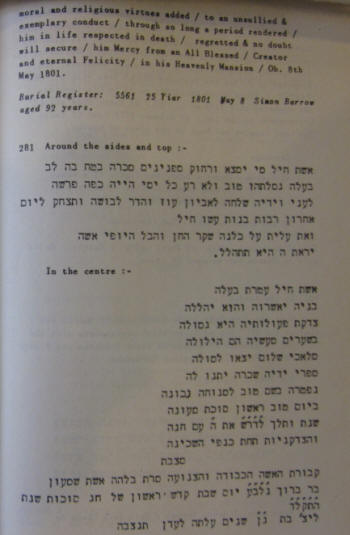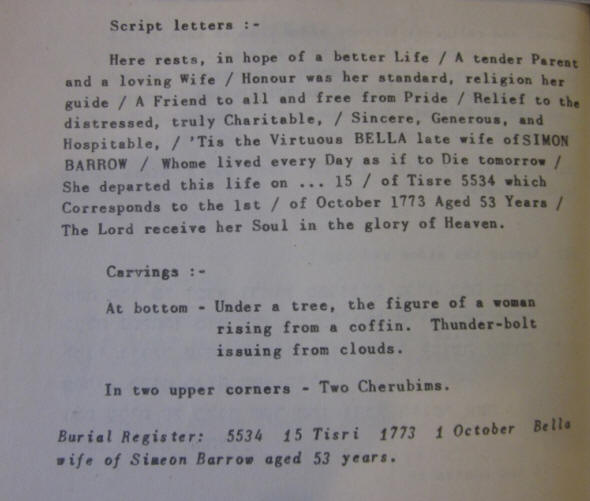


When the existence of this website was drawn to the attention of the Jewish Historical Society of England, whose publications figure prominently amongst our references and sources, on the occasion of Julian Land joining the society in January 2013, Edgar Samuel immediately got in touch. He is a noted Anglo-Jewish historian whose works are referred to extensively on this website. This has led to a great clarification in our thinking. Some of the developments have been:
He has helped us draw out the significance of the data we had developed on the Barbados element in the Jamaican Lousadas, and this led us to accept that the Jamaican Lousadas came from Barbados - a conclusion much stronger than one can find in the literature because of our new evidence.
This conclusion itself greatly reduces the likelihood that the Jamaican Lousadas had any close link to the Duque de Losada, but Edgar also provided the views of his (deceased) father Wilfred Samuel, to the effect that there were no direct links and that the vacant title was bought. We have adopted this view based on our research which shows no official Spanish recognition of the English Dukes. On 20 Aug 2015 he provided a further helpful interpretation - that the ease of adopting the title was oversold by the Spanish heralds and/or genealogists who advised the early Lousada Dukes. The names of Edgar and Wilfred Samuel can be found in our references and sources and key documents.
He has identified Simon Barrow of Barbados as a Ashkenasi (see images and discussion below) - using an interpretation of gravestone data that we were unqualified to make, and found the name of Simon Barrow's Prague brother. This observation greatly assists us in looking at where Simon Barrow came from and his family links and ancestry.
He pointed out some interesting aspects of the Nunes Cardozo family, with whom the Barrows intermarried, though we have not made any great use of this information to date.
He confirmed our data on the Amsterdam Louzadas to mean that the London/Barbados Lousadas came from Livorno.
He provided some data on the Barrow&Lousada business relationship, which enabled us to flesh out the relationship between the Barrows and the Lousadas around 1800.
On 13 Sep 2013 by email he suggested that it is likely that the Lamegos of Bordeaux and Lousadas like Julian Land descend from Antonio Rodrigues Lamego of Rouen.
On 22 October 2013 he inspected the photograph of Isaac Lamego's tombstone in the Bevis Marks archive and read from the Portuguese that age at death was 8*; he suggests that it was from the English version that the 8 has been misread as a 5 leading to age at death of 57 appearing in the published register. He feels some sympathy for Hyamson's statement in Anglo-Jewish Notabilities that the life span was 1685-1767 and thinks it may have been based on an earlier reading perhaps by Sir Thomas Colyer-Fergusson before damage to the gravestone by acid corrosion caused by the East London chemical industry.
On 24 Jul 2014 he provided data on the first finta paid by Aaron Lamego in 1714 - it was £9 compared with £14-10-0 paid by Aaron Israel Pereira the top merchant. In 1724 it was £5-6-8 compared with £13-10-0 paid by Aaron Israel Pereira.
On 29 June 2015 he showed us the two Lousada prayerbooks in the Bevis Marks archive.
11. He thought that Antonio Louzada aka Moses Baruh Lousada must have grown up and trained as a Jew as he was asked to draw up the Code of Ascomot for the reconstituted London community in 1663 - and was not a recent arrival direct from Portugal.
12. In the Dec 2016 issue of Shemot, the journal of the Jewish Genealogical Society of Great Britain he published a useful summary of the history of Portuguese Jews since 1492 and their arrival in England, and including a guide to the resources available to help people researching their Portuguese Jewish ancestry (ref 193).
| Here is the entry in ref 61 for Simon and Bella Barrow of Barbados. Edgar Samuel read the Hebrew for us and found that the name of the husband was written in the Ashkenasi style and the name of the wife was spelt in the Ashkenasi way. |
 |
 |
 |